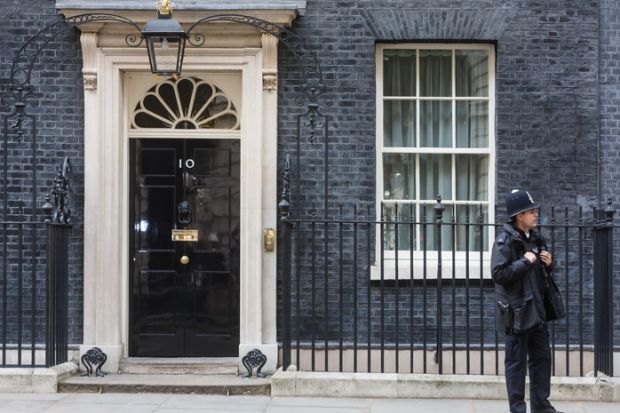Theresa May’s tears at the lectern as she announced her intention to resign won’t wash away the memory of the strategic errors on Brexit that caused her downfall: her decision to invoke Article 50, her decision to call a snap election in which the government lost its majority, her decision to prioritise the internal harmony of the Conservative Party above seeking a consensus in Parliament.
The quirks of Ms May’s personality, in which these decisions were rooted, have also been evident in her approach to policy relating to universities – where she has been a highly significant figure and where her exit could be a major turning point.
Most immediately, her plan to resign as Tory leader on 7 June, setting in motion a leadership election to decide the next prime minister, has huge implications for the government’s post-18 education review – May’s personal project. The report from the review’s independent panel seems likely, at time of writing, to be published next week – in what has risibly been described as an attempt to secure a “legacy” for Ms May. Given the wider political context, that looks a bit like detonating a bomb, throwing an acorn into the crater as you leave and expecting it to grow into an oak tree.
The only minister who wanted to hold this review was the prime minister – she announced it in her speech at the 2017 Tory party conference, in a panic about the perceived electoral impact the Labour Party’s pledge to abolish tuition fees had scored with younger voters.
To ram through her plan to hold a review, she had to eject an education secretary and a universities minister from the Department for Education (both Justine Greening and Jo Johnson fiercely opposed the review, fearing that a cut in university funding would harm access for poorer students).
The review has plenty of political opponents (without mentioning the university sector) before it has even been published and will land in the most turbulent political climate imaginable, without its political parent. At best, the review report will look like damaged goods from the outset.
After the review panel reports, there is little prospect of the current House of Commons passing any legislation that cuts present funding levels for any subjects or courses, or limits the number of students who can access loans based on their grades. Any such machinery would meet opposition not just from Labour but from Tory rebels led by Greening and Jo Johnson, who would be particularly eager “saboteurs”.
Whoever makes it to No 10, it would be highly surprising if they were to view it as a priority, while wrestling with the Brexit crisis, to try to implement any controversial recommendations from the review panel in the current Commons.
Many in the sector think that the best the review panel could hope for, in the short to medium term, is that some of their recommendations end up as Conservative manifesto pledges at the next general election.
Behind the review are issues of collapsing political faith in universities and scepticism in several government departments about the economic value of certain courses, scepticism unleashed by more detailed graduate earnings figures. These issues won’t go away – but May’s departure makes it less likely that the post-18 review will be the key vehicle for these concerns.
The other important implication from May’s exit for universities is the brightening prospect for liberalisation of the overseas student visa regime – where she was the most important obstacle as home secretary and as prime minister. Countering her stance, Jo Johnson has launched an amendment to the immigration bill from the back benches, aiming to bring back post-study work visas. May’s exit increases the already high chances of success for that amendment, which has cross-party support.
Liberalising the student visa regime could be a good, common-sense step for a new prime minister seeking to signal a dividing line with May, a step that would be welcomed across party lines and by many national newspapers.
Boris Johnson (a former shadow higher education minister) is widely seen as the favourite to be the next prime minister – although favourites have traditionally taken a fall in Tory leadership races.
If he were to take charge, universities might fear that will increase the chances of a no-deal Brexit – catastrophic for them on any number of fronts.
But on a far more micro level, Boris Johnson as prime minister might get his first briefings on the post-18 education review and overseas student visas from his brother, Jo (him again).
So maybe, in some ways, Jo Johnson might be the most important member of the Johnson family to watch for universities.




